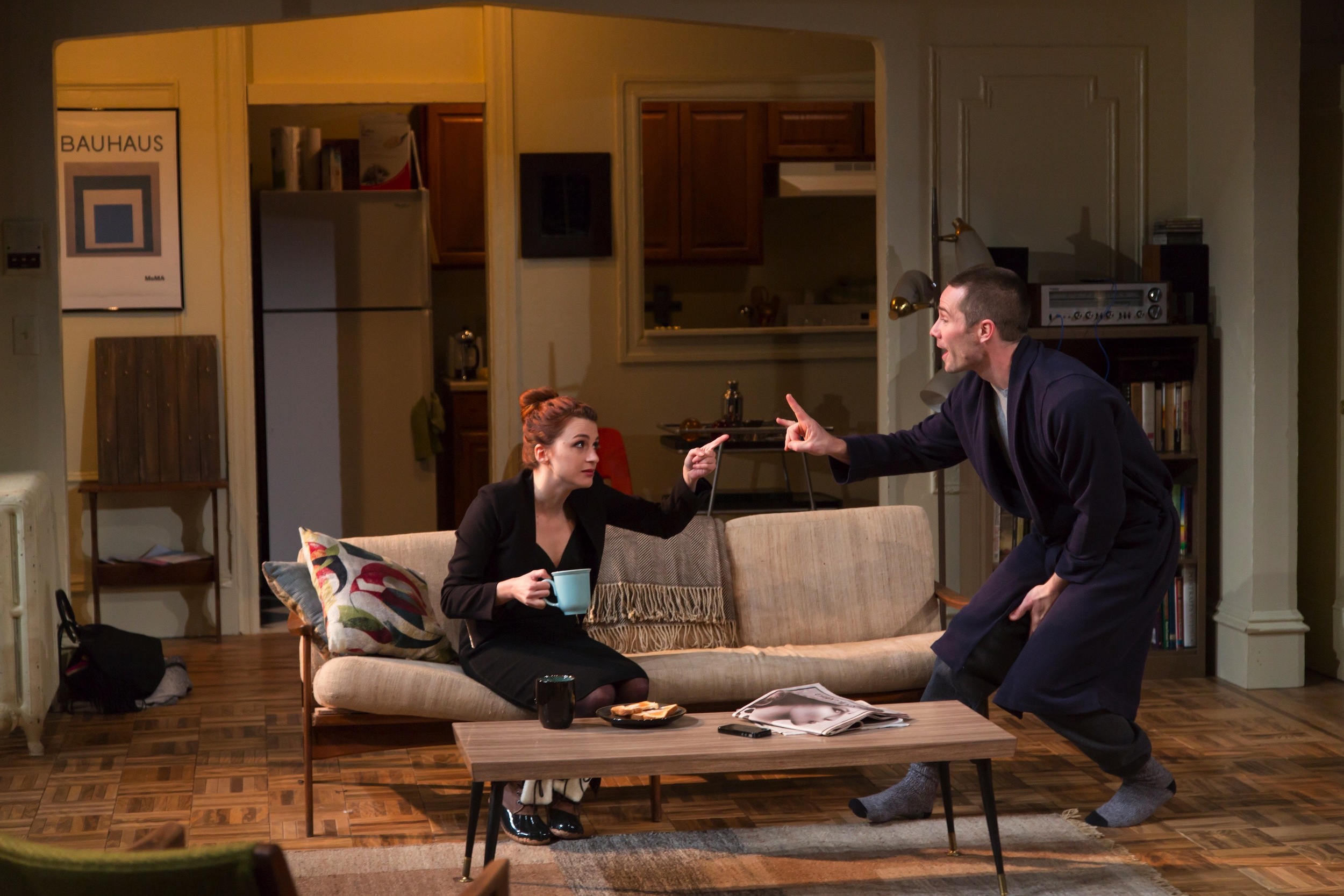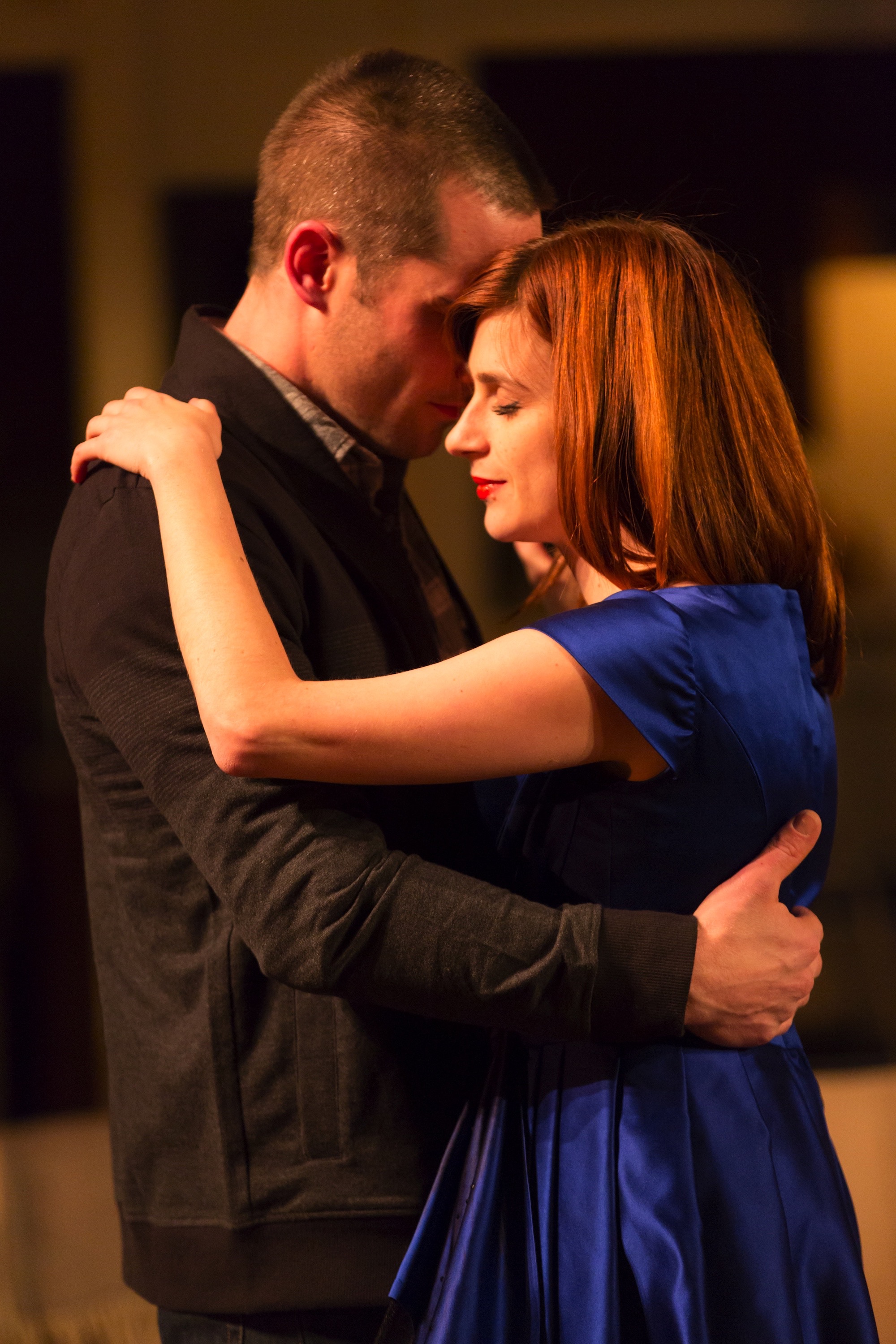Review of Reverberation at Hartford Stage
Reverberation, the new play by Matthew Lopez now playing at Hartford Stage, directed by Maxwell Williams, presents a story of coping with trauma. It’s been a year since a terrible thing happened in the life of Jonathan (Luke Macfarlane), an illustrator of condolence cards, who has been living in the same apartment building in Astoria for 15 years. In fact, he lived for all but the last year with his partner Gabriel in the apartment above his current domicile. The change in apartments was his first act in trying to cope.
We learn this before the end of the Act I, but when we first meet him, Jonathan seems merely a withdrawn loner. He hates leaving his apartment after dark and his only contact with others comes via down-and-dirty hook-ups via Grindr (an app for males prowling for other males). The play opens in medias res—in the midst of intense coupling between Jonathan and a younger man, Wes (Carl Lundstedt). Wes is more or less blown away by the sex and actually tries to be sincere about it afterwards. Jonathan just wants him out of there.
Next, Jonathan similarly blows off his upstairs neighbor, Claire (Aya Cash), a female gadabout in her late twenties. Claire, who rightly claims she’s “barely domesticated,” leads what seems a party-girl lifestyle. About the only things she owns are an inflatable mattress, a tube TV, a camp chair and, most importantly, a clothes-rack full of designer stuff—and when she really needs something high end, she “borrows” it from the department store where she works. A need for help with a zipper on one such to-die-for dress is what first sends her to Jonathan’s apartment where she doesn’t attempt to seduce him so much as attempt to induce sex. It gets awkward fast and soon she’s out the door and Jonathan is onto his next anonymous coupling.
Of course, this is going to be about how getting to know the girl next door turns things around for this guy, at least for that lonely time of year, from pre-Thanksgiving to just before Christmas, that occupies the play. By the end of Act I, after he spills to her the horrible hate-crime killing of his lover Gabriel, Jonathan and Claire are actually sleeping together—just sleeping. It’s sweet, and that’s what Claire thinks Jonathan is. He knows better, and tries to warn her. The question hanging in the air at the end of Act I is: is this a play about redemption through connection, as a gay man learns to overcome a traumatic event that cost him the love of his life, or is it about how the dark side can destroy even the best of provisional buddies?
When Act II opens we feel like we’re in some zippy rom-com where Jonathan becomes more or less a mothering “girlfriend” to mostly friendless Claire—her only contacts apart from Jonathan, despite her age, appearance, and keen fashion sense, are married men who take her out and then expect to bed her. Life for these urban anyones is all about quid pro quo sex acts until Claire and Jonathan begin to care for each other because they get to know each other—and a dreamy Christmas in a cabin in Vermont is, no lie, what they have in mind for a getaway. And we may be hoping that’s where Lopez wants to take us, showing how “two lonely people, strangers in the night” can share a dance and a kiss and flirt with the notion that they can be in love with each other and not be lovers. Sure.
Off-stage is a “Real Real Boy” who seems the kind of Gentleman Caller our Claire has been awaiting all this time, though we might suspect she’s also been dodging such in her knocking about with dealers—cards in Vegas, drugs in L.A.—as well as time in Paris and London, to say nothing of “way too long” in Orlando. In other words, Claire keeps on the move, and when she stands up Real Real Boy, it echoes the story Wes, who returns to Jonathan, fatefully, to try once more, tells about the reason he was on Grindr in the first place: he got stood up by friends on his birthday. Lopez’s characters are the people romantic comedies are never about. They’re the people who know that relationships don’t work out or that, when they do, someone comes along and bashes it.
I’ve stressed the importance of trauma in the character of Jonathan because it’s easy to be fooled by his coping mechanisms. And everything he does is a coping mechanism. Somewhere underneath it all—the hiding and the warmth—is a very, very raw nerve ready to snap. Macfarlane plays Jonathan quite believably as the sort of guy who is wrapped so tightly he’s a mystery even to himself. Early on, a clichéd phonecall from Mom and Dad, anxious about whether he’s coming home for Thanksgiving, could have been used to give us something more than irked refusals to share, but, even so, Macfarlane lets body language and very neutral tones tell us a lot more than his words do, as we spy upon this man.
And looking on as voyeurs is key to the theatrical experience here. Andromache Chalfant’s amazingly detailed set creates two completely different spaces: the Spartan look of Claire’s contrasts the lived-in clutter—complete with huge paintings by the late Gabriel on every available wall—of Jonathan’s space. And Matthew Richards’ lighting acts almost like another character or at least a narrator. We see how eerie the dark spaces can be at night, as Jonathan’s nightmares make him call into uncertain shadows in his own apartment and the darkness above in Claire’s, while morning light makes everything feel homey and communal. The stairs outside the apartments' doors also plays its part, not simply as connection between two floors and, initially, two worlds, but also as a space of impromptu encounters. Williams’ direction and the set design make great use of open and closed doors.
As Claire, Aya Cash doesn’t play to the Holly Golightly or Sally Bowles comparisons one might be tempted to make; she’s not a loveable kook nor a sly charmer. She’s just an average youngish woman who considers herself too ordinary to expect anything extraordinary from life. Lopez wisely keeps her from ever becoming a succoring figure in the relationship, a fact that’s important to the play’s ending. And as Wes, Carl Lundstedt plays with perfect pitch the hardest scene of all: a smitten lover trying to be real rather than charming or clever or sexy.
Reverberation is a sensitive and provocative play, often entertaining in its speech rhythms and interactions, fun to watch in its use of movement and space and light, and full of the cadences of people dropping their façades and picking them up again. Even the lines that don’t quite work—there’s a particularly egregious use of the “sympathy card” idea at a key point—are within the realm of what these characters might attempt for a laugh or a stab at depth or as avoidance. Elements such as the right song at the wrong time may seem heavy as “triggers,” and the play’s dramatic outcome too sudden, but the final tableau takes us and Jonathan back to where he’s been all along.
Reverberation
By Matthew Lopez
Directed by Maxwell Williams
Set Design: Andromache Chalfont; Costume Design: Linda Cho; Lighting Design: Matthew Richards; Sound Design: Tei Blow; Dramaturg: Elizabeth Williamson; Stage Manager: Marisa Levy; Assistant Stage Manager: Arielle Goldstein; Assistant Director: Sarah Hartman; Production Assistant: Chandalae Nyswonger
Hartford Stage, February 19-March 15, 2015







